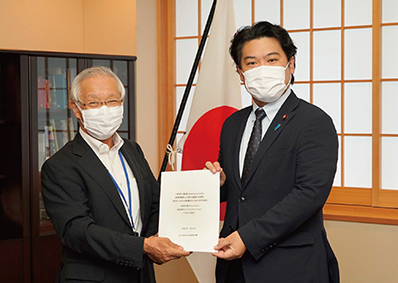(10) Science, Technology, and Innovation (STI) for SDGs
In the world today, social changes occur in diverse industries, including not only the manufacturing industry and the service industry but also agriculture and construction, by utilizing information and communication technology (ICT), Note 74 artificial intelligence (AI) and robotics.
Based on the 2030 Agenda for Sustainable Development (Paragraph 70), the UN has established the United Nations Inter-agency Task Team on STI for the SDGs (UN-IATT) and is promoting STI for the SDGs on a global scale, in cooperation with each country. In 2021, the United Nations Multi-Stakeholder Forum on Science, Technology and Innovation for the Sustainable Development Goals (STI Forum) was held again and international expectations for STI are increasing as a key to realize the SDGs while optimizing limited resources.
● Japan’s Efforts

Science and Technology Advisor to the Minister for Foreign Affairs Matsumoto presenting the recommendation “Planetary health: STI for food systems transformation” and the STI showcase (collection of case studies) to then State Minister for Foreign Affairs Washio
In the process of Japan’s economic development, Japan has overcome its own challenges in fields such as health and medical care, environment, and disaster risk reduction, fully utilizing STI. Based on these experiences, Japan is engaged in science and technology cooperation through the Science and Technology Research Partnership for Sustainable Development (SATREPS) program Note 75 and others in order to resolve challenges that developing countries are facing. The Project for Strengthening of the Environmental Radiation Control and Legislative Basis for the Environmental Remediation of Radioactively Contaminated Sites in Ukraine, which was implemented in 2021, is a good example of problem-solving through the SATREPS program (see “Master Techniques from Japan to the World 3” and “Master Techniques from Japan to the World 4” for details on specific initiatives of the SATREPS program).
Furthermore, Japan is advancing research and analysis towards the establishment of an “STI for SDGs Platform,” which is to promote the use of Japan’s advanced science and technology that could help developing countries to achieve the SDGs.
The UN-IATT is conducting the Global Pilot Programme in the five pilot countries – Ethiopia, Ghana, Kenya, India and Serbia, in order to encourage countries to formulate STI for SDGs Roadmaps across the world. Under this programme, Japan has provided assistance to Kenya in the agricultural sector since FY2020 through its contributions to the World Bank.
In 2021, the Advisory Board for Promoting Science and Technology Diplomacy Note 76 presented the recommendation “Planetary health: STI for food systems transformation” prepared for the UN Food Systems Summit and the Tokyo Nutrition for Growth Summit 2021. Based on this recommendation, the Advisory Board compiled an STI showcase of STI cases that presents Japan’s strengths, to improve hunger and malnutrition and contribute to food systems transformation, taking the global environment into consideration.
- Note 74: See Note 5.
- Note 75: See the glossary.
- Note 76: At MOFA, Science and Technology Advisor to the Minister for Foreign Affairs Matsumoto and the Advisory Board for Promoting Science and Technology Diplomacy, a group of academic experts in fields related to science and technology diplomacy, support the activities of the Minister of Foreign Affairs on related matters. Their aim is to strengthen the collaboration and networks with the advisors and related parties in Japan and abroad. They advise the Minister for Foreign Affairs and related departments on matters such as how to incorporate science and technology in the planning and drafting process of various foreign policy strategies.
